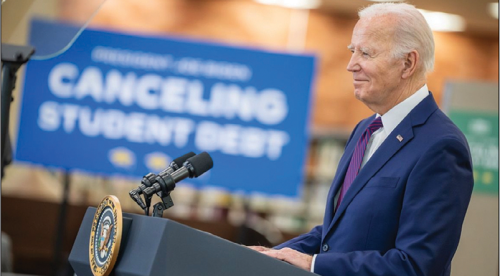On Wednesday, February 21, the President of the United States made a significant announcement, extending his student loan forgiveness program to forgive loans taken by 150,000 Americans, totaling $1.2 billion.
This action comes amidst the backdrop of ongoing elections, with young voters having played a pivotal role in supporting the President during the 2020 presidential elections.
In his statement, President Biden emphasized the increasingly exorbitant cost of obtaining a college degree, despite it being seen as a pathway to a better life. He highlighted the burden of debt that many Americans carry in pursuit of higher education.
“The pursuit of a college degree remains a vital aspiration for a prosperous life, but the financial barriers are staggering,” remarked Biden, underscoring the importance of education alongside its hefty price tag, which often leaves individuals grappling with insurmountable debt.
The loan forgiveness initiative targets individuals enrolled in the voluntary Savings on a Valuable Education (Save) repayment plan, offering relief to those who have consistently made payments for a minimum of 10 years and have borrowed $12,000 or less. According to Department of Education data, approximately 7.5 million people are currently enrolled in the repayment plan established by the Biden Administration.
Originally slated for implementation in July, the loan forgiveness program has been expedited to commence in February, a move believed by experts to be aimed at bolstering approval ratings ahead of upcoming elections.
Following the announcement, Republican critics voiced concerns, characterizing the initiative as a misuse of government funds that could be allocated more effectively elsewhere.
Contrastingly, Maxwell Frost, the first Generation Z member of the US Congress, lauded the President’s actions, drawing a distinction from the previous administration’s approach. Frost remarked, “The President’s actions on student debt stand in stark contrast to Trump, whose tenure was marked by efforts to undermine assistance for borrowers striving to navigate financial challenges.”
Overall, the extension of loan forgiveness reflects the Biden Administration’s commitment to addressing the financial hurdles associated with higher education, particularly amid a backdrop of economic uncertainty and political scrutiny.

